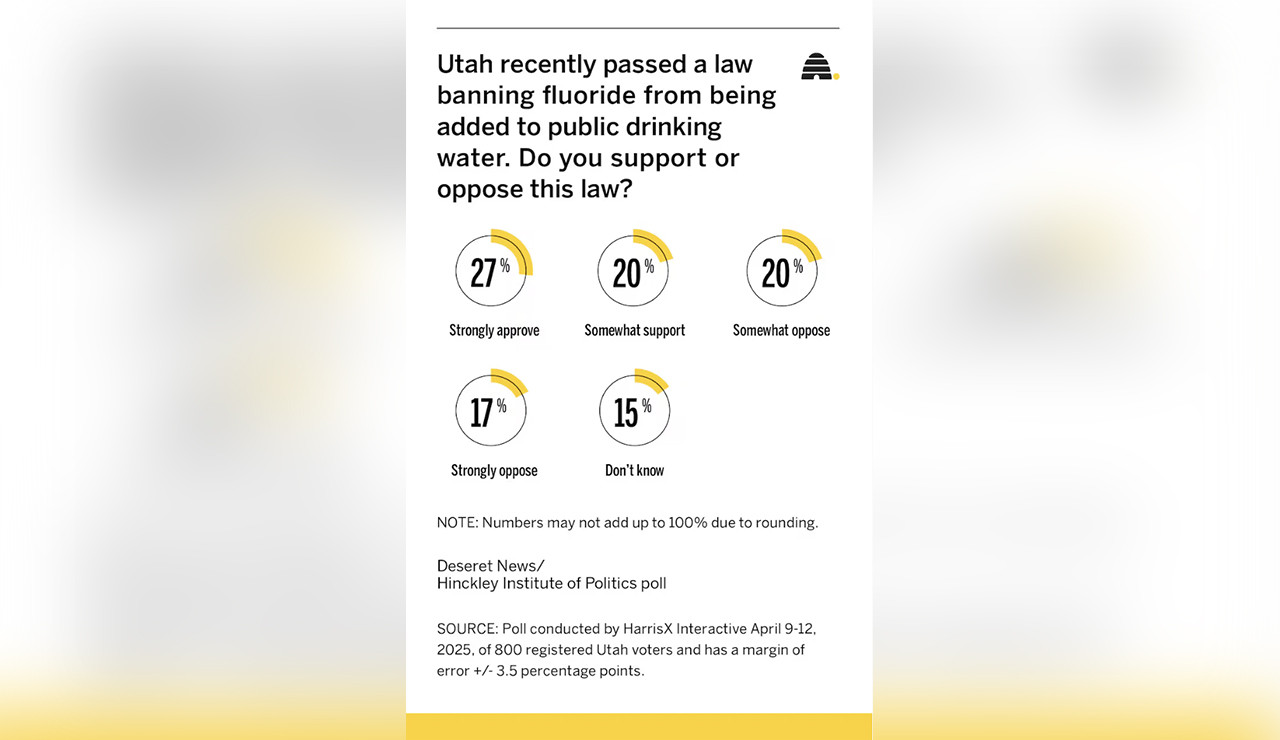Estimated read time: 4-5 minutes
- Utah bans fluoride in drinking water, sparking debate on public health benefits.
- A poll shows 47% of Utah voters support the ban, while 37% oppose it or somewhat oppose it.
- Critics argue fluoride prevents dental decay; supporters cite safety and autonomy concerns.
SALT LAKE CITY — Do Utahns want fluoride in their drinking water?
A new poll underscores the contentious nature of what played out during this last legislative session amid intense and emotional hearings at the state Capitol regarding dental health and what's in your water.
Utah carved out its place in regulatory history in the United States when it became the first in the nation to ban the introduction of the substance in drinking water systems with legislation sponsored by Rep. Stephanie Gricius, R-Eagle Mountain.
The legislative measure, passed primarily on party lines and signed into law by Utah Gov. Spencer Cox, does not prohibit the availability of fluoride. Residents can purchase it over the counter without a prescription — but the new law precludes it as an additive to public drinking water.
The new Deseret News poll revealed 47% of registered Utah voters approve or somewhat approve of removing fluoride from drinking water, while 37% are opposed or somewhat opposed. In total, 15% don't know. The poll tapped 800 registered Utah voters in a survey conducted April 9-12 by HarrisX under the purview of the Hinckley Institute of Politics and the Deseret News.
A Kennedy weighs in
Waving a flag of vowing to "Make America Healthy Again," the once Democratic presidential candidate Robert F. Kennedy Jr., who later endorsed the reelection of President Donald Trump, was picked by Trump to head the U.S. Department of Health and Human Services. In just a couple of months, Kennedy has come out on a number of controversial issues when it comes to public health.
Kennedy has long been a critic of the mass distribution of fluoride in drinking water and recently visited Utah, bluntly saying the fluoride ban is appropriate.
"It does not belong there," Kennedy said.
The professional dental community on all levels strongly disagrees.

The American Dental Association, joined by the Utah Dental Association and other medical professionals, argued strenuously against the ban, asserting fluoride added to water is an advancement in public health unrivaled with proof it prevents dental decay. There was an immense campaign pressuring the governor to veto the bill, but he signed it into law.
Several other states are following the lead of Utah, but it remains a wildly divisive topic with questions that surround mandates, bodily autonomy and what may happen to underserved populations deprived of fluoride.
Dr. Rodney Thornell, president of the Utah Dental Association, said the fight against fluoride goes against medical advancements and science.
"Fluoridation is one of the most studied and beneficial public health interventions of the last century," he said in a statement.
Both Lorna Rosenstein, executive director of Waterwatch of Utah, and Paulina Flint, chair of the board of trustees for the White City Water Improvement District, said they believe the 2019 fluoride overfeed in Sandy spurred government action.
"Water is an irreplaceable commodity," Rosenstein said, emphasizing fluoride in drinking water systems added exorbitant costs to systems that need upgrades while still safeguarding the public.
"I think after COVID there became this notion that you can't always trust what the government says to put in your body," she said. "People began questioning. ... We have to be very, very careful with what we do with our water, how we handle it, how much it costs, what the risks and liabilities are of the water agencies."
The Sandy aftermath
A state-required report documenting the health impacts of the accidental release in Sandy in February 2019 said there were 239 cases of human exposure in which people experienced gastrointestinal symptoms such as vomiting and headaches.
At the time, the state's top drinking water regulator said the Sandy overfeed was an awakening of sorts.
"Sandy City is not an isolated event," said Marie Owens, who was the director of the Utah Division of Drinking Water at the time. She said there were 170 "near miss" events in drinking water supplies over the course of just a year that included boil orders, chemical spills and severe operational failures.
"Statistically, on average, there was one of these events every other day in the state of Utah," she said. "I don't need to explain to you that is unacceptable."
Owens pointed to one instance in which there was a hole in a drinking water tank.
"Any rodent could walk right up to that tank and do whatever," she said. "Fall in. Hang out."
But what is fluoride? It is a naturally occurring ion of the element fluorine. While that is true, what gets put in the water is different. It is derived from a hydrofluorosilicic acid that in its undiluted form is classified as a hazardous, poisonous material that, while it contains fluoride, also contains arsenic, lead, copper, manganese, iron and aluminum. It is a byproduct from phosphate mining operations.










